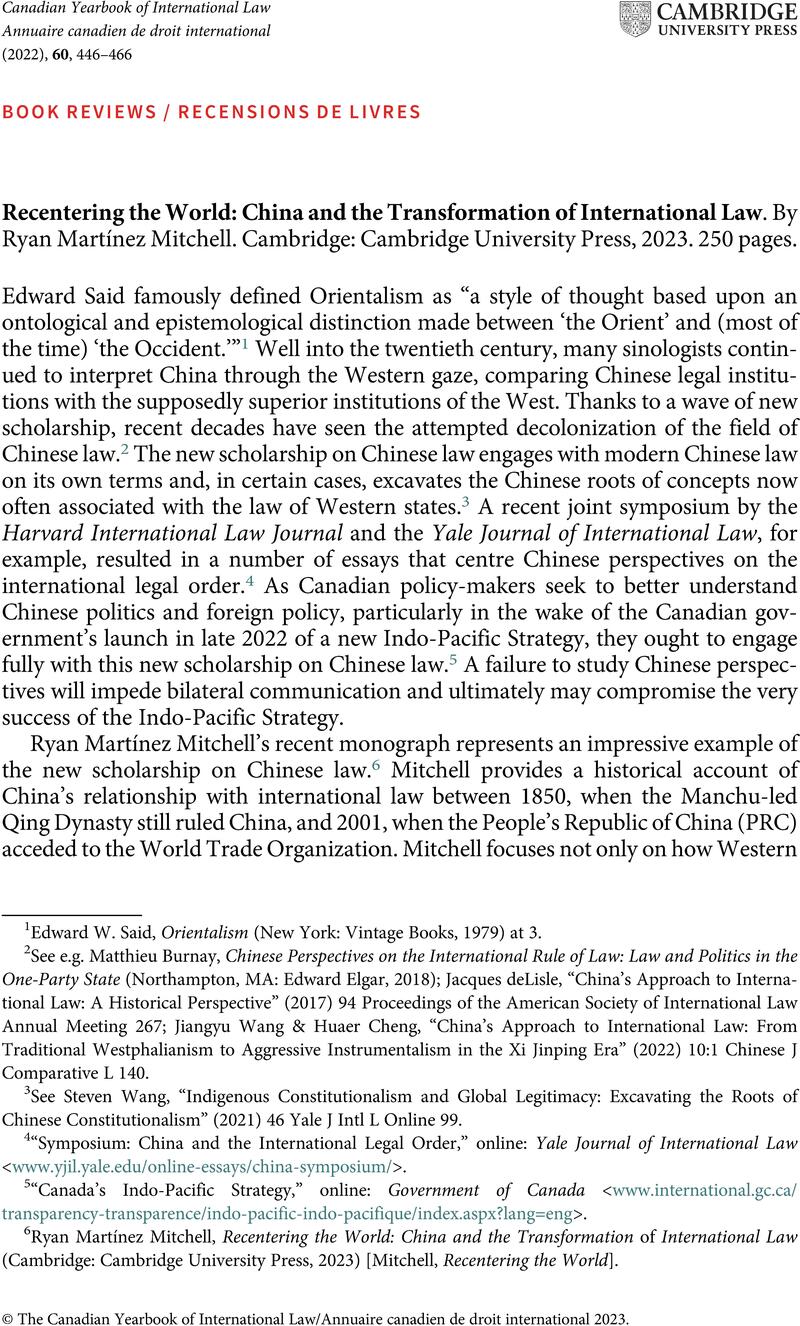No CrossRef data available.
Published online by Cambridge University Press: 26 May 2023

1 Said, Edward W., Orientalism (New York: Vintage Books, 1979) at 3 Google Scholar.
2 See e.g. Burnay, Matthieu, Chinese Perspectives on the International Rule of Law: Law and Politics in the One-Party State (Northampton, MA: Edward Elgar, 2018)Google Scholar; deLisle, Jacques, “China’s Approach to International Law: A Historical Perspective” (2017) 94 Proceedings of the American Society of International Law Annual Meeting 267 Google Scholar; Wang, Jiangyu & Cheng, Huaer, “China’s Approach to International Law: From Traditional Westphalianism to Aggressive Instrumentalism in the Xi Jinping Era” (2022) 10:1 Chinese J Comparative L 140 Google Scholar.
3 See Wang, Steven, “Indigenous Constitutionalism and Global Legitimacy: Excavating the Roots of Chinese Constitutionalism” (2021) 46 Yale J Intl L Online 99 Google Scholar.
4 “Symposium: China and the International Legal Order,” online: Yale Journal of International Law <www.yjil.yale.edu/online-essays/china-symposium/>.
5 “Canada’s Indo-Pacific Strategy,” online: Government of Canada <www.international.gc.ca/transparency-transparence/indo-pacific-indo-pacifique/index.aspx?lang=eng>.
6 Mitchell, Ryan Martínez, Recentering the World: China and the Transformation of International Law (Cambridge: Cambridge University Press, 2023)Google Scholar [Mitchell, Recentering the World].
7 Ibid at 13. Elsewhere, Mitchell notes that the “concept of guoti has received curiously limited attention in modern Sinology, let alone in Western comparative scholarship on political or legal theory”: Ryan Martínez Mitchell, “Global Capitalism, International Law, and Chinese Sovereignty” (31 January 2022), online: Legal Form: A Forum for Marxist Analysis and Critique <legalform.blog/2022/01/31/global-capitalism-international-law-chinese-sovereignty-ryan-martinez-mitchell/>.
8 Mitchell, Recentering the World, supra note 6 at 13.
9 Ibid at 13.
10 Ibid at 29–30.
11 Ibid at 97.
12 See e.g. Rana Mitter & Elsbeth Johnson, “What the West Gets Wrong About China,” Harvard Business Review (May–June 2021), online: <hbr.org/2021/05/what-the-west-gets-wrong-about-china>.
13 Mitchell, Recentering the World, supra note 6 at 109–10.
14 See ibid at 216.
15 Ibid at 186.
16 See e.g. Ikejiaku, Brian-Vincent, “International Law Is Western Made Global Law: The Perception of Third-World Category” (2013) 6 African JL Studies 337 Google Scholar.
17 See e.g. Craft, Stephen G, V.K. Wellington Koo and the Emergence of Modern China (Lexington: University Press of Kentucky, 2004)Google Scholar.
18 French, Howard, Everything under the Heavens: How the Past Helps Shape China’s Push for Global Power (New York: Alfred A Knopf, 2017) at 248 Google Scholar.
19 Mitchell, Recentering the World, supra note 6 at 203.
20 Darren Byler, “Why Xinjiang Is an Internal Settler Colony” (1 September 2021), online: The China Project <thechinaproject.com/2021/09/01/why-xinjiang-is-an-internal-settler-colony/>. See also James A Millward, “Is China a Colonial Power?” New York Times (4 May 2018), online: <www.nytimes.com/2018/05/04/opinion/sunday/china-colonial-power-jinping.html>.
21 See e.g. Mitchell, Recentering the World, supra note 6 at 195.
22 Ibid at 204.
23 Ibid.
24 Ibid at 194.
25 Ibid at 97.
26 Ibid at 219.